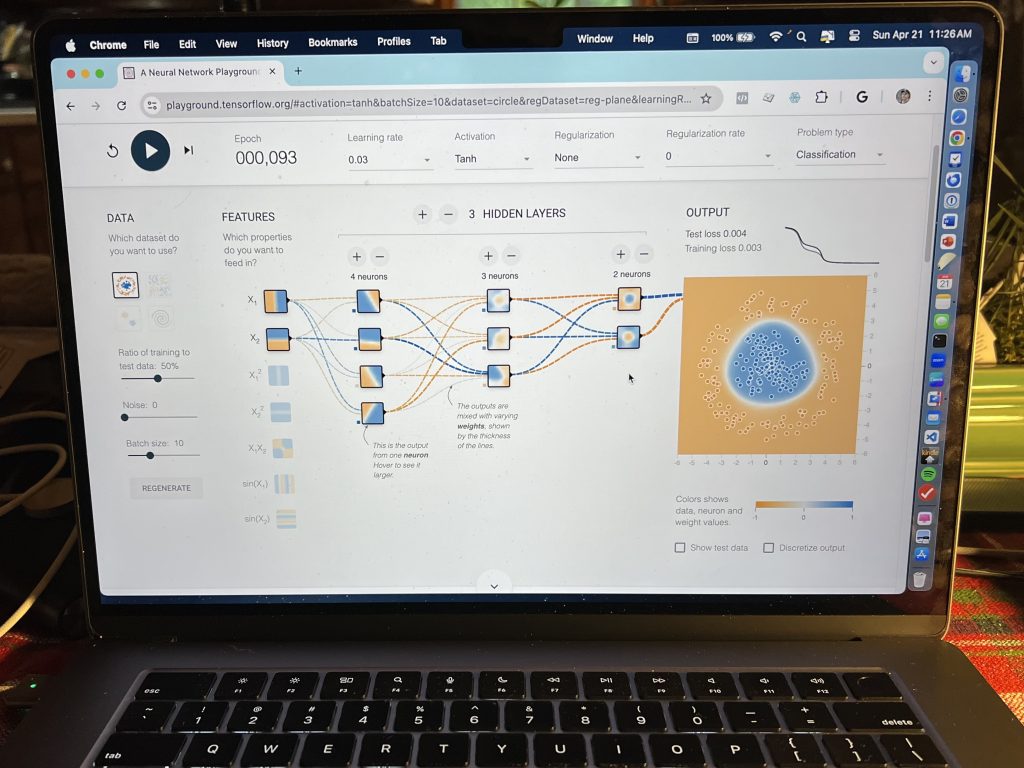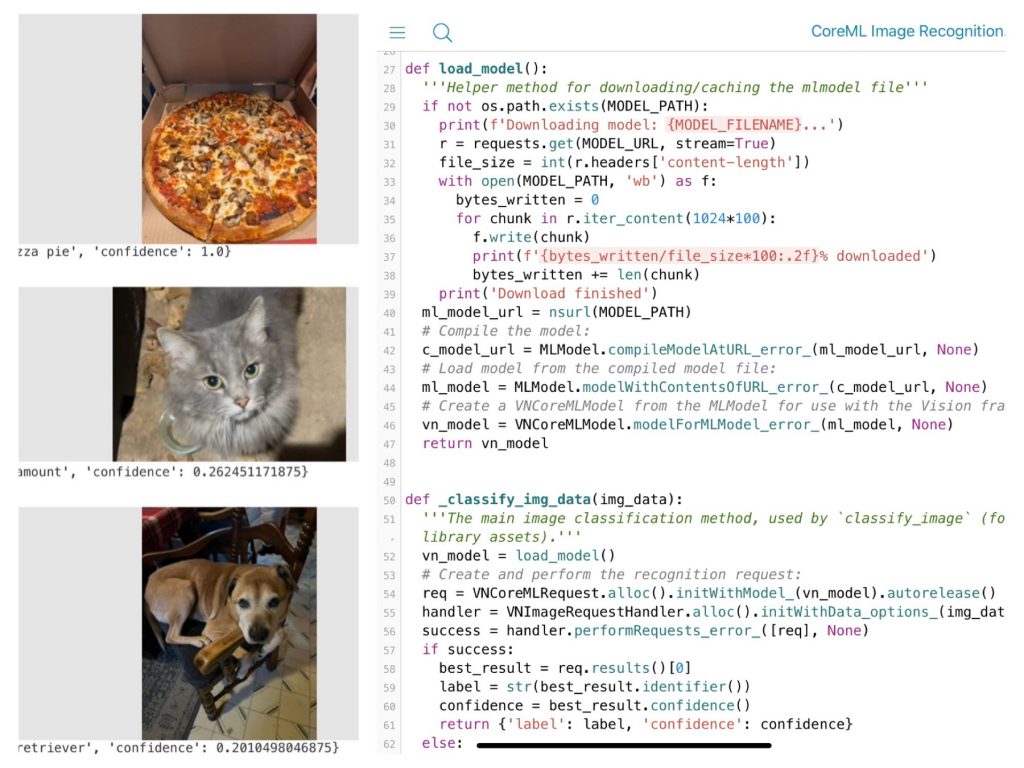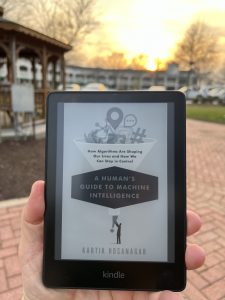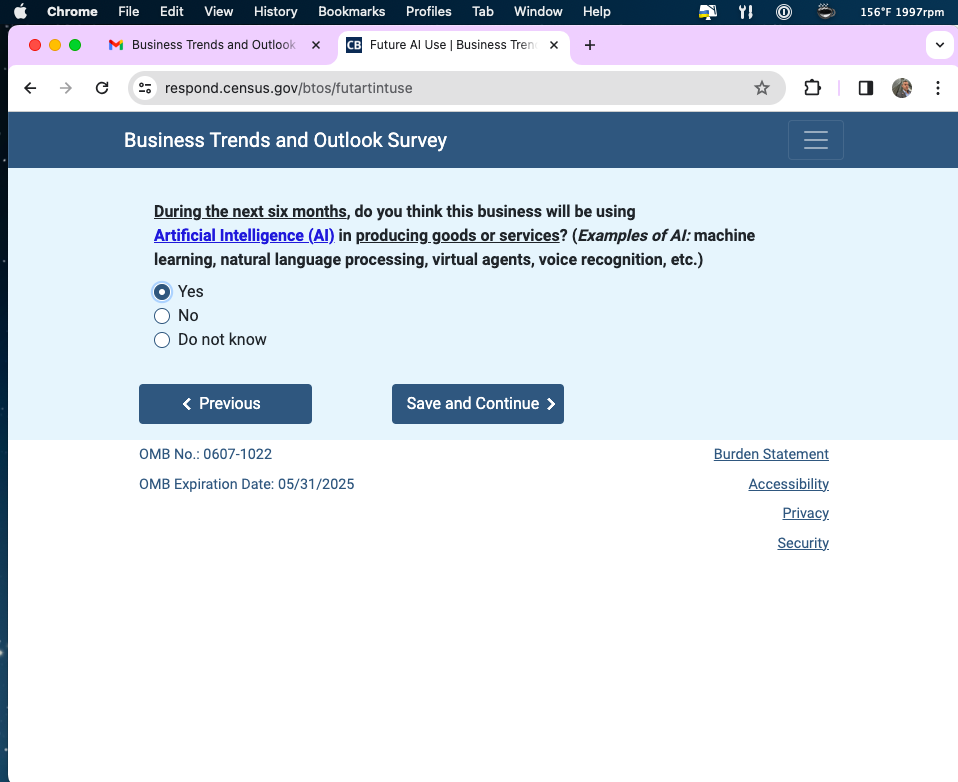Last fall, I wrote an article about how I use Artificial Intelligence (AI) in my small business. The article proved to be quite popular and I was even interviewed about it by two local universities. That article was based on my past experiences as a math/computer science professional and recent experience using ChatGPT for most of 2023 with my digital marketing agency.
Six months have passed since that article was written. Many things have changed since then, and even more change is just around the corner. Fortunately, nothing I said in that article is wrong or obsolete (yet), but things change fast, and I felt it was time to provide an update.
AI is one of the top three topics clients and people in the community ask me about, with questions such as:
- Will AI take away jobs? Yes, it’s already happening, but it’s also creating them.
- Should I use AI for my marketing? Yes and no. It’s a great helper but not a replacement for human creativity. Use it like a personal assistant to help you.
- Should I replace my doctor, accountant, or lawyer with AI? No, because AI doesn’t know your specific situation and often gives bad advice, especially in complex situations. It also can’t explain it’s answers.
- Should I write blogs or emails exclusively with AI? No, because it’s just churning out old ideas without context or direct experiences. However, it can be a great writing assistant for idea generation and proof-reading.
- Should I generate images/videos with AI? Yes and no. Many AI-generated images/videos still look fake. However, it can help touch up images and videos. Be aware of AI-generated deepfake images and videos on the Internet.
- Can I write computer programs with AI? You mean you’re not already doing that? You have some serious catching up to do. Try it and you’ll see what I mean.
- How can I learn more about AI? That’s easy do these three things – 1. Read about it (see suggested books later in this article), 2. Try it out using ChatGPT, Gemini, or CoPilot, 3. Talk to others about how they’re using it.
- What’s in store for AI in the future? Glad you asked, this updated article will attempt to answer that question. However, no one really knows for sure and that includes the experts who created it.

Real-time graphical representation of an Artificial Neural Network (ANN) solving a data classification problem successfully using Deep Learning (DL) via TensorFlow. Photo/Joe Domaleski
Before diving in, it may be useful to understand the differences between the terms: Artificial Intelligence (AI), Machine Learning (ML), Artificial Neural Networks (ANN), and Deep Learning (DL). Here’s an excellent, very readable overview from IBM. These terms are related and often co-mingled, but they are quite different. For purposes of this article, we’ll just stick with AI as an umbrella term.
If you missed my original story from last fall, here are some of the key points:
- ChatGPT is OpenAI’s Generative Pre-trained Transformer AI offering that can generate content using a chatbot interface. It continues to dominate the personal, desktop use of general-purpose AI. It runs in a browser and as a mobile device application.
- Ways that I used AI last year included: research, idea generation, proofreading, problem-solving, and data analysis.
- Prompts are used to make requests of AI technology typically using a chat interface and work best when you provide both context and direction.
- AI has some big drawbacks, and because of that, I do not recommend using it for sensitive data processing, long-form written content, or image/video creation by itself. Use it like a personal assistant.
Although AI has been around since the 1950s, it’s had an up-and-down history over the years with failed promises. About ten years ago, the “AI winter” began to thaw, and things started to come together as AI began to show up in our phones and computers embedded as voice recognition, image identification, route planning, spell checking, translation systems, and recommendation engines. Most people referred to these systems as “smart” or “intelligent” without specifically using the term AI, which had somewhat of a checkered history of hype. All of that changed at the end of 2022.
When OpenAI launched ChatGPT 3.5 at the end of 2022, it introduced the world to generative AI, in which your computer could seemingly write and create images for you automatically. Everything changed, and AI reached mass awareness in 2023. Even though it was already in many of our phones and computers, most people didn’t take notice. As the biggest tech launch of all time, ChatGPT allowed all of us to dabble in computer-generated writing and image creation exercises. ChatGPT’s emergent, generative capabilities caught everyone off guard, including the team that created it.
Admit it, you created something with ChatGPT last year and amazed your friends with what it could do. My article last year was an attempt to put some realism into how one might use AI because it can’t do everything. If 2023 was the year of generative AI emergence, what’s ahead for the future?
In order to answer that question, I’ve spent the last six months stepping up my research and use of AI because I’m the type of person who likes to know how things work. Over the winter, I enrolled in several online courses, including some post-graduate classes, to update my knowledge with the tools and techniques of AI including Python programming, machine learning algorithms, statistics, linear algebra, data science, R programming, and data analytics. I even wrote my own AI program on an iPad to do image recognition.

AI program written in Python that is running on an iPad to demonstrate Machine Learning (ML) image recognition of pictures from my photo roll. It got the pizza correct but wasn’t able to determine the breed of my cat or dog (hence the low confidence percentage). Photo/Joe Domaleski
In addition to the technical courses, I’ve also studied what the leading business schools are saying about AI and business. Here’s some recent non-technical books I’ve read and recommend for business professionals and those with an interest in the current state of AI:

Reading the Kindle version of A Human’s Guide to Machine Intelligence by Dr. Kartik Hosanagar during the sunset in downtown Fayetteville, GA. Photo/Joe Domaleski
- The Worlds I See by Dr. Fei-Fei Li of Stanford. Considered one of the leaders in AI image recognition, Dr. Li has written a very readable book that I couldn’t put down. It not only gives an insider view into the emergence of computer vision but also tells the story of how a female Chinese immigrant succeeded in male-dominated engineering. Highly recommended for everyone, but especially for young women pursuing STEM careers.
- A Human’s Guide to Machine Intelligence by Dr. Kartik Hosanagar of Wharton. This is a great book that explains how AI and algorithms are used in business and society. I was inspired to read this book after taking Professor Hosanagar’s excellent AI and Business course through the Wharton Business School. He has a knack for taking complex ideas and simplifying them and making them relatable.
- Co-Intelligence by Dr. Ethan Mollick also of Wharton. If you only have time to read one book about AI, this is the book to read. Co-Intelligence is brand new and just came out earlier this month (April 2024). This book should be required reading for today’s business leaders. Professor Mollick used AI to help co-write the book and documents the process. This is a first hand account of how someone actively uses AI – the good and the not so good. In the book, Mollick encourages us to consider AI as a co-worker and collaborator. It’s both entertaining and thought-provoking.
So, what’s new in AI in 2024? If 2023 was the year of awareness and hype, 2024 will be the year of more realistic expectations. Earlier this year, I wrote about important trends for small businesses in 2024, quoting an IBM study that emphasized, “People who use AI will replace people that don’t.” Almost five months in and that’s proving to be very true.
No matter where you’re at in your career, knowing how to properly use AI is going to be an essential skill for the future. It won’t be good enough that you can write or create simple images with AI – everyone can do that now. It’s assumed knowledge that everyone knows how to use an AI prompt. We’re moving from the “what” to the “so what”. The modern business professional will need to know how to properly use AI by considering such factors as:
- Myth vs. Reality – there’s a lot of AI hype right now and almost every software product I use purports to have an embedded AI feature, even my invoicing system. What type of AI is being used and what exactly is it doing?
- Industry knowledge – AI by itself isn’t very helpful unless you are able to properly prompt it and verify what it generates. This will require industry knowledge to maximize the utility provided by AI.
- Relevance – specifically, how does the AI-generated solution relate to my business, customer, or task that needs to be done?
- Accountability – how trustworthy is the AI generated content and what happens if it’s wrong?
- Authenticity – how well does the AI generated content fit into a human world? Does it look fake and what impact will that have? People like to relate to other people. (NOTE: fellow marketing companies, please stop with the fake abstract AI images already.)
- Security – data security is already a problem with all computer systems, so how will AI handle confidential information put into its “black box”?
- Explainability – just having the answer isn’t enough, how well can AI explain how it arrived at its conclusions?
- Bias – there’s been some well documented situations of bias in AI-generated content. How can one reduce bias without overcompensating?
- Cost – billions of dollars are being poured into AI-solutions. What is the ROI for an AI project?
- Maintenance – I recently read that some AI systems are running out of new data to process. Society is building all of these AI systems, but how are they going to be maintained in the future?
- Offline AI – most AI system require a persistent internet connection. Two months ago AT&T had a massive network wide failure when their cell network was offline for more than eight hours. What happens to critical AI systems when the Internet is not available.
- Creativity – maybe the most essential question related to AI. Are AI systems creative and how can we tap into that power? I partially answered that question in this article about the importance of creativity.
Armed with the above knowledge and considerations, here’s what I see ahead in 2024 with AI, particularly with small businesses like mine:
- Even more AI hype – admittedly, there’s no agreed upon definition of what artificial intelligence is. Because it’s trendy, even more companies are going to jump on the AI bandwagon by repackaging existing products & services with the AI label. Trends come and go, so I would use caution in overusing the AI term which may fall out of fashion later.
- Increase of embedded AI systems – this is already happening and likely to increase this year. It’s widely expected that Apple is going to make some significant AI announcements for its products in June 2024 (we’ll check back later to see if that happens). Right now, voice and keyboard chat are the two main ways to interact with AI. This is likely to grow into new ways to leverage AI as it gets embedded into more systems.
- More generative AI options – ChatGPT stole the show in 2023, but newer systems are emerging such as Microsoft CoPilot (formerly Bing AI), Google Gemini (formerly known as Bard), and Meta AI (built on LLAMA-3) to name a few. Speaking of names, the tech giants are struggling with the branding of their AI tools so watch out for name changes.
- Growing gap between AI users and non-users – it’s not lost on me that it’s fashionable to position oneself as a technical Luddite especially in many executive circles. Someone recently told me that they were glad they retired before the AI revolution. The business leaders of the past could get away with that. Leaders of the future can’t and are already putting AI to good use, creating efficiencies that were unthinkable in the past. Results-oriented leaders of today will use AI, just as the leaders of yesterday used personal computers. AI has the potential to democratize information, so don’t get left behind.
- Increase in AI legal and ethical concerns – it’s fairly well known that laws struggle to keep up with technology. It’s taken decades for the Internet to be regulated – some say it’s regulated too much and others not enough. There’s almost no regulation of AI right now. Moreover, it’s being dominated by a handful of companies. Is that good or bad?
- Big changes ahead for internet search – Keep an eye on this one business leaders, particularly with regards to your marketing. Google totally dominates the search for information, products, and services online. Although search is free, advertising on Google is not. Search Engine Marketing (SEM or Pay-Per-Click) is one of the top ways for a business to get noticed online. This aspect of search is heavily monetized by providing revenue for Google and advertising opportunities for businesses. So far, AI like ChatGPT doesn’t have ads. Many consumers are looking up things on AI instead of doing traditional Google searches. Google is scrambling to adapt. What is already starting to happen is a morphing of the two technologies as frameworks like Google Search Generative Experience (SGE) continue to evolve. What does this mean for the consumer trying to buy products & services as well as the business who is trying to market to those consumers? We don’t know yet, but be prepared for change!
Looking ahead for the remainder of 2024, I still believe that the practical and thoughtful application of AI will be of great benefit, particularly to small businesses. It’s already been a big help to us. Apparently, I’m not the only one interested in how AI can be used by small businesses. If you’re a business owner, you’re familiar with the mandatory Business Trends and Outlook Survey (BTOS) from the US Census Bureau. If not, then you should know it’s a required government survey that businesses must complete to develop insights into the state of the economy. The last several versions of the survey have included AI-related questions such as this one:

US Census Bureau Business Trends and Outlook Survey (BTOS) question about AI from March 2024. Photo/Joe Domaleski
Big business has been using AI for years, but now it’s affordable and available to the smallest of businesses. I don’t have a human personal assistant and never have. At this point in my career, I’m not sure I need one. AI helps me analyze data, schedule meetings, look things up, summarize information, and think through ideas—much like a human assistant. Understanding how it works, what I can do with it, and where the technology is going ensures that my team and I use it ethically to improve efficiency, innovation, and helpfulness in the work that we do for our customers. Equally important is knowing when not to use it. Churning out AI-generated content is unimaginative and rarely produces the desired results. Human-centric creativity supported by AI is the way of the future. How do you plan to use AI this year? (PS – We’re working on a small-business focused AI offering under the label of “Country Fried Labs” so stay tuned for more about that later this year!)
[Joe Domaleski, a Fayette County resident for 25+ years, is the owner of Country Fried Creative – an award-winning digital marketing agency located in Peachtree City. His company was the Fayette Chamber’s 2021 Small Business of the Year. Joe is a husband, father of three grown children, and proud Army veteran. He has an MBA from Georgia State University and enjoys sharing his perspectives drawing from thirty years of business leadership experience. Sign up for the Country Fried Creative newsletter to get marketing and business articles directly in your inbox. You can connect with Joe directly on LinkedIn for more insights and updates.]
